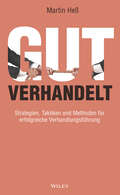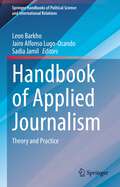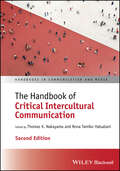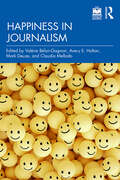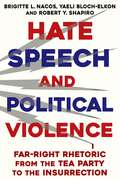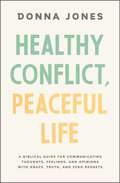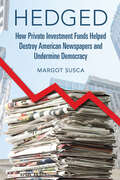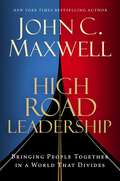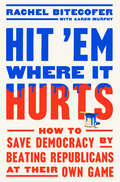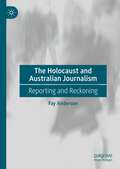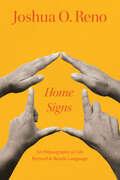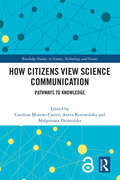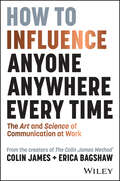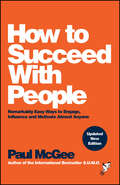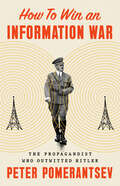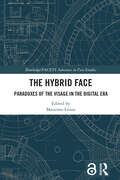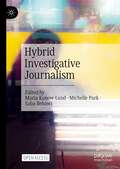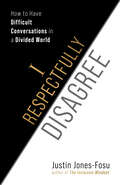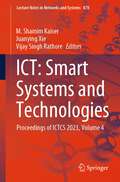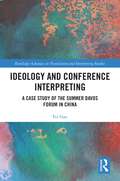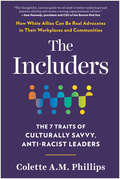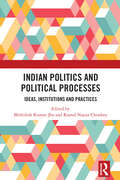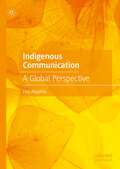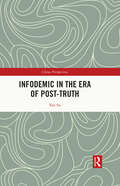- Table View
- List View
Gut verhandelt: Strategien, Taktiken und Methoden für erfolgreiche Verhandlungsführung
by Martin HeßDas umfassende Buch von Martin Heß liefert sowohl Einsteigern als auch erfahrenen Verhandlern eine Vielzahl wertvoller Anregungen, um erfolgreich zu verhandeln, sei es im Business-Umfeld, als Vertreter einer Gruppe von Menschen, oder in eigener Sache im privaten Bereich. Das Buch verbindet theoretische Grundlagen aus Kommunikationspsychologie, Spieltheorie, Systemtheorie und Emotionspsychologie mit praktischen Tipps und Techniken, um den Leser auf ein höheres, professionelleres Niveau der Verhandlungsführung zu heben. Das Buch gliedert sich in zwei Teile: den Theorieteil, der den wissenschaftlichen Hintergrund des Verhandelns behandelt, und den Praxisteil, der bewährte Strategien, Taktiken und Methoden für erfolgreiche Verhandlungen präsentiert. Im Text finden die Leser Checklisten und Fragenkataloge zur professionellen Vorbereitung und Durchführung von Verhandlungen (inklusive Formulierungsvorschläge). Zudem wird ein Phasenmodell des Verhandelns vorgestellt, das als allgemeiner Orientierungsrahmen dient. Dieses Buch ist genau das Richtige für diejenigen, die einerseits wissenschaftlich gesicherte Erkenntnisse über Verhandlungen interessieren und gleichzeitig aber auch ganz praktische Ratschläge für Strategien, Taktiken und Formulierungen für ihre eigenen Verhandlungen finden wollen.
Handbook of Applied Journalism: Theory and Practice (Springer Handbooks of Political Science and International Relations)
by Leon Barkho Jairo Alfonso Lugo-Ocando Sadia JamilThis authoritative handbook looks at the entire news cycle and provides a bridge between the theoretical and academic study of journalism and its actual contemporary practice. The book's main merit is that it brings theory and practice together, with contributors discussing these issues from different perspectives in a way that scholars, students, and practitioners can find useful in the study of journalism. The handbook is also unique as it undertakes an international scope across regions and cultures, both from the West and the Global South, while providing an overview which balances the (over-) emphasis on content in most academic approaches to journalism.The book is divided into four major parts: (1) Conceptual foundations, (2) Interlink between journalism as scholarship and journalism as practice, (3) Regions and cultures, and (4) The practitioner world. The first two sections lay down the foundation for section (3) which provides an overview of journalism practice in different regions and cultures. Section (4) includes contributions by practitioners in which they attempt to respond to some of the issues raised in preceding sections.This handbook will appeal to academics, practitioners, and professionals alike, who are interested in a better understanding of the academic study of journalism and its actual contemporary practice.
The Handbook of Critical Intercultural Communication (Handbooks in Communication and Media)
by Thomas K. Nakayama Rona Tamiko HalualaniAn up-to-date and comprehensive resource for scholars and students of critical intercultural communication studies In the newly revised second edition of The Handbook of Critical Intercultural Communication, a lineup of outstanding critical researchers delivers a one-stop collection of contemporary and relevant readings that define, delineate, and inhabit what it means to ‘do critical intercultural communication.’ In this handbook, you will uncover the latest research and contributions from leading scholars in the field, covering core theoretical, methodological, and applied works that give shape to the arena of critical intercultural communication studies. The handbook's contents scaffold up from historical revisitings to theorizings to inquiry and methodologies and critical projects and applications. This work invites readers to deeply immerse themselves in and reflect upon the thematic threads shared within and across each chapter. Readers will also find: Newly included instructors' resources, including reading assignments, discussion guides, exercises, and syllabi Current and state-of-the-art essays introducing the book and delineating each section Brand-new sections on critical inquiry practices and methodologies and contemporary critical intercultural projects and topics such as settler colonialism, intersectionalities, queerness, race, identities, critical intercultural pedagogy, migration, ecologies, critical futures, and more Perfect for scholars, researchers, and students of intercultural communication, intercultural studies, critical communication, and critical cultural studies, The Handbook of Critical Intercultural Communication, 2nd edition, stands as the premier resource for anyone interested in the dynamic and ever evolving field of study and praxis: critical intercultural communication studies.
Happiness in Journalism
by Valérie Bélair-Gagnon Avery E. Holton Mark Deuze Claudia MelladoThis book examines how journalism can overcome harmful institutional issues such as work-related trauma and precarity, focusing specifically on questions of what happiness in journalism means, and how one can be successful and happy on the job. Acknowledging profound variations across people, genres of journalism, countries, types of news organizations, and methodologies, this book brings together an array of international perspectives from academia and practice. It suggests that there is much that can be done to improve journalists’ subjective well-being, despite there being no one-size-fits-all solution. It advocates for a shift in mindset as much in theoretical as in methodological approaches, moving away from a focus on platforms and adaptation to pay real attention to the human beings at the center of the industry. That shift in mindset and approach involves exploring what happiness is, how happiness manifests in journalism and media industries, and what future we can imagine that would be better for the profession. Happiness is conceptualized from both psychological and philosophical perspectives. Issues such as trauma, harassment, inequality, digital security, and mental health are considered alongside those such as precarity, recruitment, emotional literacy, intelligence, resilience, and self-efficacy. Authors point to norms, values and ethics in their regions and suggest best practices based on their experience. Constituting a first-of-its-kind study and guide, Happiness in Journalism is recommended reading for journalists, educators, and advanced students interested in topics relating to journalists’ mental health and emotion, media management, and workplace well-being. This book is accompanied by an online platform which supports videos, exercises, reports and links to useful further reading.
Hate Speech and Political Violence: Far-Right Rhetoric from the Tea Party to the Insurrection
by Brigitte L. Nacos Robert Shapiro Yaeli Bloch-ElkonHow did the United States descend into crisis, with institutions frayed, political violence mounting, and democracy itself in peril? This timely book identifies how the Tea Party and its extremist narratives laid the groundwork for the rise of Donald Trump, his MAGA movement, and the January 6, 2021, assault on the Capitol.Brigitte L. Nacos, Yaeli Bloch-Elkon, and Robert Y. Shapiro trace the escalation of a strain of extremist rhetoric in right-wing political discourse after the inauguration of Barack Obama. Drawing on extensive and in-depth analysis of political communication in both traditional media and online spaces, they demonstrate how the dominant rhetorical styles of the Trump era were pioneered by the Tea Party. A backlash to the election of the first Black president, this reactionary social movement deployed violent language and spread anti-Obama paranoia, with the assistance of media insiders, GOP leaders, and conservative advocacy groups. Donald Trump rose to political prominence by hitching himself to the “birther” racist conspiracy theory, espoused by many Tea Partiers, and drew from their aggressive and hyperpartisan repertoire. Ultimately, this book shows, the increasingly violent rhetoric of right-wing extremists spilled over into real-world political violence. Revealing the path the Tea Party blazed to Trump and the insurrectionists, Hate Speech and Political Violence provides timely new insights into the threats facing American democracy.
Healthy Conflict, Peaceful Life: A Biblical Guide for Communicating Thoughts, Feelings, and Opinions with Grace, Truth, and Zero Regret
by Donna JonesAuthor, speaker, and pastor's wife Donna Jones gives women a practical, biblical blueprint for making regret-free choices in the middle of real-life conflict so they can exchange relational turmoil for personal and relational peace.We've all had moments where we look back on a conflict, shake our heads, and think, why did I handle it that way?With three decades of ministry experience, Donna Jones has had a front-row seat to--and been in the middle of--all kinds of conflict and she understands the regret, guilt, heartache, and hurt conflict can produce. But she also knows it's possible for God to use those chaotic, painful moments and turn them into opportunities for better connection with those around us. With encouragement, warmth, and wisdom, Donna shows readers how to navigate the stressful confusion conflict can bring and helps them todiscover the single most important quality necessary to handle conflict well;communicate thoughts, feelings, and opinions with grace, truth, and zero regret;be equipped to handle conflict in a God honoring way by exchanging conflict styles that hurt with conflict styles that heal; identify common conflict mistakes and prevent unnecessary disagreements and defeat; andstop being pulled into other people's drama and remain calm in the midst of chaos. Whether readers are dealing with daily disagreements or occasional blowups, Healthy Conflict, Peaceful Life offers them a new paradigm, one where they learn how to honor God when they've been hurt, communicate when they'd rather retaliate, and move toward others when it seems easier to run away.
Hedged: How Private Investment Funds Helped Destroy American Newspapers and Undermine Democracy (The History of Media and Communication)
by Margot SuscaThe untold history of an American catastrophe The ultrawealthy largely own and guide the newspaper system in the United States. Through entities like hedge funds and private equity firms, this investor class continues to dismantle the one institution meant to give voice to average citizens in a democracy. Margot Susca reveals the little-known history of how private investment took over the newspaper industry. Drawing on a political economy of media, Susca’s analysis uses in-depth interviews and documentary evidence to examine issues surrounding ownership and power. Susca also traces the scorched-earth policies of layoffs, debt, cash-outs, and wholesale newspaper closings left behind by private investors and the effects of the devastation on the future of news and information. Throughout, Susca reveals an industry rocked less by external forces like lost ad revenue and more by ownership and management obsessed with profit and beholden to private fund interests that feel no responsibility toward journalism or the public it is meant to serve.
High Road Leadership: Bringing People Together in a World That Divides
by John C. MaxwellLeadership can be a blessing or a curse. It can help people rise up to a better life, or it can cause people to fall into despair. Become part of the solution by becoming a high-road leader.The world&’s most influential leadership expert, John C. Maxwell, tackles the problem of our divided world in his latest book High Road Leadership. &“Everything rises and falls on leadership,&” says Maxwell. &“Today it is causing people to fall—into disputes, frustration, anger, and despair. His solution is to expose the problems of taking the low and middle roads when interacting with others and teach people how to instead take the high road. Leaders who practice high road leadership value all people, do the right things for the right reasons, take accountability for their actions, and place people above their own agenda. In his trademark communication style, Maxwell teaches the principles and practices of high-road leadership that can increase anyone&’s influence and help them make their world a better place.
Hit 'Em Where It Hurts: How to Save Democracy by Beating Republicans at Their Own Game
by Rachel BitecoferA radical, urgent plan for how the Democratic Party and its supporters can win elections at one of the most pivotal moments in the history of our nation&’s democracy&“Bitecofer hits hard against the GOP tactics of fear and anger and the Democrats&’ status quo narratives around political engagement and winning elections.&”—Michael Steele, former RNC chairWhy do Democrats fail to win voters to their side, and what can they do to develop new winning political strategies—especially as the very fate of democracy hangs in the balance in 2024? Too often the carefully constructed, rational arguments of the Left meet a grisly fate at the polls, where voters are instead swayed by Republican candidates hawking anger, fear, and resentment. Only when Democrats are handed an overwhelming motivational issue—like the Supreme Court&’s 2022 Dobbs decision overturning Roe v. Wade—have they found a way to counter this effect.Political scientist and strategist Rachel Bitecofer came to prominence after predicting the size (to the seat) of the Democrats&’ rare Blue Wave in the 2018 midterms. At the heart of her prediction lay a powerful concept—negative partisanship, or the idea that voters, even most so-called independents, don&’t vote for their candidate so much as they vote against their candidate&’s opponent. Seen through this lens, Hit &’Em Where It Hurts is a deep dive into the Republicans&’ own playbook, sharing how Democrats can turn the Right&’s own tactics against them. The way for Democrats to wage—and win—electoral war, Bitecofer writes, is to present themselves as &“brand ambassadors for freedom, health, wealth, safety, and common sense,&” the very opposite of the extremist, freedom-fearing Right. This is a last-ditch effort to armor democracy while there is still time to save and strengthen it against hijacking by a small minority of ideologues.As America careens into the election cycle that will determine its democratic future, Hit &’Em Where It Hurts is the book for any Democrat who has ever banged their head against a wall when obvious reasoning failed to sway voters over to their side. This guide is a lifeline to save American democracy in its darkest hour.
The Holocaust and Australian Journalism: Reporting and Reckoning
by Fay AndersonThis book explores the Australian press reporting of the persecution and genocide of European Jews, and the extent to which the news of the Holocaust was known and believed, revealed and hidden, and acknowledged and minimised. Spanning the coverage of Hitler’s political ascent in the 1920s through to the Nazis’ extermination campaign, it culminates in the accounts of the trials of Nazi war criminals and the post-war transnational migration to Australia of Holocaust survivors, to a country far from universally welcoming in its reception of them. The book also tells the story of the journalists who reported on these tragic events and the editors who published them, along with the political, social and cultural context in which they worked, in an environment influenced by exclusionary ideas about race and nationality that did not necessarily inspire sympathy for Jews and their trauma. This book sheds light on the ethics of reporting human suffering, violence and genocide and – centrally – on the role of the press in shaping Australia’s collective memory of the Holocaust. It encourages readers to think critically about media power, public apathy, advocacy, and the importance of truth. Disturbing evidence of increasing anti-Semitism in Australia as elsewhere, along with continuing Holocaust denial, provide an additional urgency to this study.
Home Signs: An Ethnography of Life beyond and beside Language
by Joshua O. RenoAn intimate account of an anthropologist’s relationship with his non-verbal son and how it has shaped and transformed his understanding of closeness and communication. Home Signs grew out of the anthropologist Joshua Reno’s experience of caring for and trying to communicate with his teenage son, Charlie, who cannot speak. To manage interactions with others, Charlie uses what are known as “home signs,” gestures developed to meet his need for expression, ranging from the wiggle of a finger to a subtle sideways glance. Though he is nonverbal, he is far from silent: in fact, he is in constant communication with others. In this intimate reflection on language, disability, and togetherness, the author invites us into his and Charlie’s shared world. Combining portraits of family life and interviews with other caregivers, Reno upends several assumptions, especially the idea that people who seem not to be able to speak for themselves need others to speak on their behalf. With its broad exploration of nonverbal communication in both human and nonhuman contexts, Home Signs challenges us to think harder about what it means to lead a “normal” life and to connect with another person.
How Citizens View Science Communication: Pathways to Knowledge (Routledge Studies in Science, Technology and Society)
by Carolina Moreno-Castro Aneta Krzewińska Małgorzata DzimińskaScience communication aims at the successful sharing and explanation of sciencerelated topics to a wider audience. In order to enhance communication between science and society, a better understanding of citizens’ habits and perceptions is needed. Therefore, it is vital to understand how citizens acquire knowledge about science- related issues, how this knowledge affects their beliefs, opinions and perceptions, and what sources of information they choose to learn about science – and how they assess their reliability. This book addresses these questions, based on the analyses of public consultations data from Italy, Poland, Portugal, Slovakia and Spain, concerned with the science communication of issues including climate change, vaccines, complementary and alternative medicine (CAM) and genetically modified organisms (GMOs). Sharing experiences of how to engage citizens in public consultation, it provides insights into the mobilisation of interest in science and offers recommendations on how to improve science communication.
How to Influence Anyone, Anywhere, Every Time: The Art and Science of Communication at Work
by Colin James Erica BagshawWe communicate all the time. But do we have impact? Do we influence? When you speak, do people lean in? When they hear you, do others feel impressed, challenged, motivated or inspired? Through tested frameworks and instantly applicable techniques, How to Influence Anyone, Anywhere, Every Time shows you how to use your words and your body language to engage and persuade. With this handbook, you'll learn crucial communication skills for delivering with impact in any professional setting — be it in the boardroom, your next sales meeting or interpersonal interactions. Master how to deliver your message with conviction, confidence and clarity. Globally renowned speaking coaches Colin James and Erica Bagshaw share their proven methodology for wielding influence in any and every context. In How to Influence Anyone, Anywhere, Every Time, they show you how to systematically get and hold people’s attention — and use your influence to achieve positive results in your organisation or business. Whether you’re working face-to-face, you need to create presence online, or you’re crafting a written message, you’ll discover the tips you need. Communicate more effectively with a tried-and-trusted process for success, using the 3 Ds: Diagnose: Who is your audience, what is the context and what is your desired outcome? Design: Get the magic 12 steps that make it easy to tailor your next communication to better engage and influence your audience. Deliver: Don't know what to do with your hands? Learn how to master body language, your voice, visual aids and even your energy for a delivery that will captivate, inspire and persuade even the toughest audience. How to Influence Anyone, Anywhere, Every Time is a must-have resource for anyone who needs to present their ideas, gain trust and bring about real change.
How to Succeed with People: Remarkably Easy Ways to Engage, Influence and Motivate Almost Anyone
by Paul McGeeTake your people skills to the next level with this easy-to-follow, step-by-step guide Let’s face it. If you want any sort of success in life, you’re going to have to deal with other people at some point. It’s also the only way to make friends, meet new colleagues, and even find your special someone. So, why does dealing with other people seem so difficult sometimes? In the newly revised second edition of How to Succeed with People: Remarkably easy ways to engage, influence and motivate almost anyone, bestselling author and international keynote speaker Paul McGee delivers yet another exciting and inspiring guide to improving your communication skills and transforming how you interact with others. You’ll learn how to get over your dread of social events and create better relationships at work and in life, as well as: Strategies for holding people’s attention when you talk and how to listen and respond appropriately to what others are saying or doing Improve your ability to confront and challenge difficult people in and outside work Develop your skills around how to empathise and support people in tough times A can’t-miss guide on how to boost your understanding of people and your success in dealing with them, this book is perfect for young professionals, managers, executives and supervisors. How to Succeed With People will also prove invaluable in helping your relationships outside of work - from dating to parenting, and from motivating others to difficult conversations. With this book, you can have immediate and actionable advice at your fingertips.
How to Win an Information War: The Propagandist Who Outwitted Hitler
by Peter PomerantsevFrom one of our leading experts on disinformation, this inventive biography of the rogue WWII propagandist Sefton Delmer confronts hard questions about the nature of information war: what if you can't fight lies with truth? Can a propaganda war ever be won? In the summer of 1941, Hitler ruled Europe from the Atlantic to the Black Sea. Britain was struggling to combat his powerful propaganda machine, crowing victory and smearing his enemies as liars and manipulators over his frequent radio speeches, blasted out on loudspeakers and into homes. British claims that Hitler was dangerous had little impact against this wave of disinformation. Except for the broadcasts of someone called Der Chef, a German who questioned Nazi doctrine. He had access to high-ranking German military secrets and spoke of internal rebellion. His listeners included German soldiers and citizens, as well as politicians in Washington DC who were debating getting into the war. And--most importantly--Der Chef was a fiction. He was a character created by the British propagandist Thomas Sefton Delmer, a unique weapon in the war. Then, as author Peter Pomerantsev seeks to tell Delmer's story, he is called into a wartime propaganda effort of his own: the US response to the invasion of Ukraine. In flashes forward to the present day, Pomerantsev weaves in what he's learning from Delmer as he seeks to fight against Vladimir Putin's tyranny and lies. This book is the story of Delmer and his modern investigator, as they each embark on their own quest to manipulate the passions of supporters and enemies, and to turn the tide of an information war, an extraordinary history that is informing the present before our eyes.
The Hybrid Face: Paradoxes of the Visage in the Digital Era (Routledge/FACETS Advances in Face Studies)
by Massimo LeoneThis original and interdisciplinary volume explores the contemporary semiotic dimensions of the face from both scientific and sociocultural perspectives, putting forward several traditions, aspects, and signs of the human utopia of creating a hybrid face. The book semiotically delves into the multifaceted realm of the digital face, exploring its biological and social functions, the concept of masks, the impact of COVID-19, AI systems, digital portraiture, symbolic faces in films, viral communication, alien depictions, personhood in video games, online intimacy, and digital memorials. The human face is increasingly living a life that is not only that of the biological body but also that of its digital avatar, spread through a myriad of new channels and transformable through filters, post-productions, digital cosmetics, all the way to the creation of deepfakes. The digital face expresses new and largely unknown meanings, which this book explores and analyzes through an interdisciplinary but systematic approach. The volume will interest researchers, scholars, and advanced students who are interested in digital humanities, communication studies, semiotics, visual studies, visual anthropology, cultural studies, and, broadly speaking, innovative approaches about the meaning of the face in present-day digital societies.
Hybrid Investigative Journalism
by Maria Konow-Lund Michelle Park Saba BebawiThis open access book is a rare example of the ethnographic study of investigative journalism. This book explores entrepreneurial attempts to combine traditional investigative journalism with alternative ways of organising this work. It transcends watershed investigative projects in favour of the ways in which new actors (citizens, technologists, bloggers and local reporters, among others) join experienced investigative journalists in experiments with the practices of watchdog journalism in the digital era. Cases include Bristol Cable, Bureau Local and the Korea Center for Investigative Journalism, as well as Forbidden Stories. The book also includes two chapters on the impact of COVID-19 upon the development of cross-disciplinary work in a traditional newsroom and in the larger media ecosystems of both Norway and China. This is a timely book for journalism students, scholars and investigative reporters, who share a passion for this form of journalism.
I Respectfully Disagree: How to Have Difficult Conversations in a Divided World
by Justin Jones-FosuStart building bridges instead of barriers! This essential guide offers a simple 5-part framework that will help you have honest and enlightening conversations despite deep and fundamental disagreements.Divisions are on the rise around the world, and 2024 may well be a peak year. We're losing the ability to disagree without dehumanizing. There is a deep need for this practical and accessible guide to having challenging conversations in any situation, from the workplace to the classroom to the dinner table.It's not about saying the right words at the right time but something vastly deeper. In this book, you'll discover the 5 pillars of respectfully disagreeing: Challenge your perspective Be the student Cultivate your curiosity Seek the gray Agree to respectBut this is not a weighty tome. Each chapter features a cartoon, and Justin Jones-Fosu tackles this serious subject with a playful and compassionate tone. For example, he writes I have become more and more intentional in my desire to respectfully disagree with others (except those who think putting ketchup on eggs is wrongthere is no hope for respect there). With a wide range of examples and exercises throughout, this is a timely and reader-friendly handbook to disagreeing with someone's ideology while passionately pursuing their humanity.
ICT: Proceedings of ICTCS 2023, Volume 4 (Lecture Notes in Networks and Systems #878)
by M. Shamim Kaiser Juanying Xie Vijay Singh RathoreThis book contains best selected research papers presented at ICTCS 2023: Eighth International Conference on Information and Communication Technology for Competitive Strategies. The conference will be held in Jaipur, India during 8 – 9 December 2023. The book covers state-of-the-art as well as emerging topics pertaining to ICT and effective strategies for its implementation for engineering and managerial applications. This book contains papers mainly focused on ICT for computation, algorithms and data analytics and IT security. The work is presented in five volumes.
Ideology and Conference Interpreting: A Case Study of the Summer Davos Forum in China (Routledge Advances in Translation and Interpreting Studies)
by Fei GaoGao uses the case of conference interpreting at the Summer Davos Forum in China to systematically reveal the ways in which ideology and linguistic ‘re-engineering’ can lead to discourse reconstruction. Translation and interpreting can never be wholly neutral practices in ‘multi-voiced’ transnational communication. Gao employs an innovative methodological synthesis to examine in depth a range of elements surrounding interpreters’ ideological positioning. These include analysing the appraisal patterns of the source and target texts, identifying ‘us’-and-‘them’ discourse structures, investigating interpreters’ cognitions, and examining the crossmodal means by which interpreters render paralanguage. Collectively, they bridge the gap between socio-political and ideological concerns on the one hand, and practical questions of discourse reconstruction in cross-language/ cultural events on the other, offering a panoramic perspective. An invaluable read for scholars in translation and interpreting studies, particularly those with an interest in political discourse or the international relations context.
Ideology and Conference Interpreting: A Case Study of the Summer Davos Forum in China (ISSN)
by Fei GaoGao uses the case of conference interpreting at the Summer Davos Forum in China to systematically reveal the ways in which ideology and linguistic ‘re-engineering’ can lead to discourse reconstruction. Translation and interpreting can never be wholly neutral practices in ‘multi-voiced’ transnational communication. Gao employs an innovative methodological synthesis to examine in depth a range of elements surrounding interpreters’ ideological positioning. These include analysing the appraisal patterns of the source and target texts, identifying ‘us’-and-‘them’ discourse structures, investigating interpreters’ cognitions, and examining the crossmodal means by which interpreters render paralanguage. Collectively, they bridge the gap between socio-political and ideological concerns on the one hand, and practical questions of discourse reconstruction in cross-language/ cultural events on the other, offering a panoramic perspective. An invaluable read for scholars in translation and interpreting studies, particularly those with an interest in political discourse or the international relations context.
The Includers: The 7 Traits of Culturally Savvy, Anti-Racist Leaders
by Colette A.M. PhillipsLearn to be a leader who is not simply &“against racism,&” but who actively advocates for diversity, equity, and inclusion as an anti-racist ally.It&’s a simple fact that the people who make policy and oversee government, sports, business, and the arts and entertainment are most commonly white men. Another fact: We cannot achieve meaningful progress if we exclude the very people who have the power to make systemic change.This easy-to-read handbook is free of any attempts to shame, blame, or guilt leaders for the choices they made in the past or privileges they were born with. Instead, readers will learn to view the work they do through a racial equity lens so they can easily and immediately begin making changes.In The Includers, Colette Phillips explores the core qualities that inclusive leaders share: character, cultural intelligence, connections, communications, collaboration, courage, and commitment. With humor and poignance, and backed by research, Phillips shares stories of real Includers: the CEOs, politicians, and public figures—all white male allies—she&’s admired, known, and, in some cases, counseled. For leaders who are ready to do their part and get beyond today&’s &“anti-woke&” rhetoric, this eye-opening guide demonstrates the business imperative of diversity, equity, and inclusion and offers practical, actionable insights from allies and advocates who are willing to listen, learn, and &“lead from behind&” to create sustainable systemic change.
Indian Politics and Political Processes: Ideas, Institutions and Practices
by Mithilesh Kumar Jha Kamal Nayan ChoubeyIndian Politics and Political Processes explores the key ideas, foundations, continuities, major shifts and challenges to the state and democracy in modern India. The book presents an in-depth analysis of recent issues and challenges confronting the Indian state and politics. Presenting a comprehensive account of the major trajectories of Indian politics, this book introduces the readers to the existing literature and enables them to think critically about major issues and institutions of politics and democracy. The chapters engage critically with the historical antecedents, major debates, and recent developments. The book also elaborately deals with issues such as populism, religious movements, minority rights, health, and the environment, which are often ignored or side-lined in the available literature on Indian politics and political processes. The book will be useful to the students, teachers and researchers pursuing courses in political science, South Asian Studies, and international/global politics and economics. It will also be an informative read for those interested in contemporary South Asian politics.
Indigenous Communication: A Global Perspective
by Eno AkpabioThis book explores global forms of indigenous communication and their connections with new and digital media. With fresh and original insights, the book transcends the confines of regional analysis to investigate similarities, parallels, and differences present in indigenous communication practices around the world.Through a systematic classification of these diverse methods, including music, myths, iconography, visual, institutional, and axiomatic communication, the author draws comparisons between geographically and historically disparate contexts. Indigenous Communication provides a rigorous conceptual clarification of indigenous forms of communication, both showcasing their various manifestations, and illuminating their relevance and transformative potential in the digital age.
Infodemic in the Era of Post-Truth (China Perspectives)
by Yan SuWith the revolution in information technology, concerns about the proliferation of false, unverified, and misleading information have been growing. As one of the severe public health crises in modern history, the COVID-19 pandemic has provided a novel context for the "post-truth" research. In a "post-truth" era, people are no longer interested in investigating objective facts, but tend to curl up in echo chambers and resonate with like-minded others. Against this backdrop, this book (1) systematically conceptualises "post-truth" and analyzes its defining characteristics and driving forces, (2) examines the nuanced effects of information sources and news consumption behaviours and strategies on COVID-19 misperceptions and knowledge, (3) explores the role of social media in shaping COVID-19-related misperceptions and knowledge, and (4) highlights the importance of news media literacy in navigating the "post-truth" era. The book will be essential reading for students and scholars of media and film studies, communication studies and comparative studies. It will also be a useful reference for medical and media professionals such as doctors, nurses and journalists.
